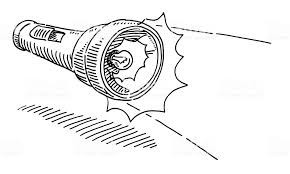The most important skill I’ll never master.
This will be the title and topic if ever I am graced with the opportunity to deliver my very own TED talk. Will that ever happen? Doubt it, but if it does…I’m ready.
I’ve been waiting for an interviewer to ask a related question so that I could take off running with a thoughtful, albeit unconventional response. A question such as what is the most important thing you’ve learned or what do you believe is your greatest strength/skill?
Being a professional flashlight holder requires a very particular set of skills, skills I have acquired over a very long career. Skills that make me a nightmare for people like you…
Okay, I’m back.
The skills and required mindset of properly holding a flashlight can be translated seamlessly to construction, project management, relationships (both professional and personal) and life in general.
My dad taught me a lot about working with my hands. He taught me everything there is to know about fixing every part of a car. He had no idea how much deeper those little lessons go and how much they’ve shaped who I am today. There were plenty of tears along the way — I got a thorough lesson in “ How to curse, in English!” right alongside how to change brake pads and shoes. Those R-rated course corrections stuck with me long after the tears dried.
If he was underneath the car fighting a seized up bolt with a jerry-rigged socket and ratchet set up, the last thing he needed was to do so blindly. That’s where I came in. Luckily for him, child labor was much cheaper than renting shop time and I couldn’t drink yet so he didn’t even have to pay me in beer.
It took a while, but I got very good — and I’m still improving. Top-notch flashlight holder. Some folks nowadays may even call that position a “sight facilitation professional” or something to spice up their resume.
…it’s not deer-tay… It’s just Dirt
As I alluded to earlier, holding a flashlight does require and build upon the same skills the project management does.
- You must focus on the task at hand by knowing what step you’re on. In order to know the step you’re on, you have to understand what you just completed.
- Know the next step. Again, to know the next step you must fully understand the step you’re on and the overall task.
- Understand why you’re doing what you’re doing. This is more of a big picture view of the job. Maybe your arm is cramping or it’s cold out…knowing that you can’t rest until it’s done otherwise someone can’t get to work, might lose their job and the snowball of hell that follows takes the edge off of that aching arm.
- You have to understand how those you work with operate. Did my dad prefer to put the wrench on, then reach down for the backup wrench or put both in his hands first? It might seem like a small detail, but not anticipating the needs and habits of those around you can spell disaster over time.
- Even if you hold the light on the right part or the right tool at precisely the right moment, you can still be wrong. Why? Because if the light is held in such a way that only you can see it, then what good are you doing? Being able to set things up with the perspectives of others in mind is exactly what project management is about.
Ultimately, understanding a project inside and out sets you up to manage that project effectively. Knowing what comes next and why allows you to prepare for the best and worst-case scenarios. Knowing what has already been done gives you a chance to learn from it.
Knowing the personalities, preferences, and needs of contractors, subcontractors, suppliers, clients, and coworkers tell you exactly what approach to take in negotiations and everyday communications.
The biggest skill of all, in my humble opinion, is the soft skill of seeing things from others’ points of view. You may as well be blind (figuratively) if you’re not able to see what’s right in front of you because you’re looking at it from the wrong angle. Solutions to both technical and interpersonal difficulties are often found in changing one’s perspective. The overused Einstein quote about using a different mindset than the one with which the problem was created readily comes to mind.
This isn’t some groundbreaking article nor is the information new. I’ve thought a lot about this over the years and realized that we have everything we need in us already, the trick is to humble ourselves through self-awareness and regular self-reflection. To me, that is the secret to sustainable personal and professional development.
Master the most basic things first because they are precisely what the big, multi-million dollar projects are built with.
Find it on Medium 🙂
